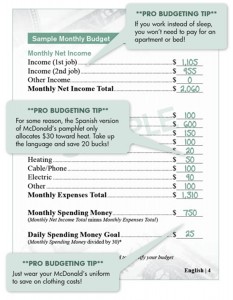Making Ends Meet: Part 2
We’ve certainly seen some sobering statistics regarding low-wage jobs out there. But — lucky us — one of the most profitable companies in the history of the world has kindly stepped up with tips for how its employees can manage their embarrassingly inadequate minimum-wage salaries.
McDonald’s recently launched a handy-dandy website that includes a wide variety of resources to help the average low-wage worker manage his or her finances. The homepage provides an informative video, asking viewers, “Do you ever wonder where all of your money goes?” The site also provides an informative workbook for workers to budget their monthly expenses and “plan for the future.”
The site’s centerpiece is the calculator tool, which helps workers of any wage figure out how to pay off student loans; save for college, retirement or a car; or budget the more realistic things, like your child’s allowance, house parties, and — get this — a million dollars. That’s right — you, too, can be a millionaire! As McDonald’s reminds us, “You can have almost anything you want as long as you plan ahead and save for it.” And here’s how.
Step 1: Budget Better
Sure, you’ve been pinching pennies and cutting coupons for years, but take a word of advice from someone who really knows what it’s like to manage a modest income: a Fortune 500 corporation! The budget generously allows you to spend $600 on rent (hopefully you don’t mind sharing a room with your kids), $150 on a car payment (should be enough to get a nice beater, hopefully you’re a good mechanic), $20 for health insurance (for a bottle of Ibuprofen, some off-brand antibiotic ointment, and a box of Band-Aids), and $50 for heating (if you live in Wisconsin, you might want to move).
That leaves you with $750 in monthly spending — and you can still squirrel away $100 in savings. So, in just 144 short years, $1 million will be yours!
Unfortunately, working a low-wage job does require some sacrifices. You might have to leave your little ones to fend for themselves, because the average $972 monthly childcare costs exceed your spending budget. Sometimes you might have to choose between paying off your debt, eating, or buying shoes for all the walking you’ll be doing, since you can’t afford gas for your car. But just ask your CEO what he recommends … if anyone knows how to make sacrifices, it’s McDonald’s, which, despite its meager $28 billion in annual profits, still manages to pay such a generous salary to its workers.
Step 2: Just Work Harder
As we see with their handy budget guide, even McDonald’s expects employees to get a second job. We hear the job market is tight — but that’s a pretty lame excuse.  Get on it! And don’t let yourself get discouraged with the fact that McDonald’s rarely provides predictable hours, because, quite frankly, that is not the attitude of a millionaire! It might take 1 million hours, but you, too, can make (almost) as much as McDonald’s CEO! So get to work!
Get on it! And don’t let yourself get discouraged with the fact that McDonald’s rarely provides predictable hours, because, quite frankly, that is not the attitude of a millionaire! It might take 1 million hours, but you, too, can make (almost) as much as McDonald’s CEO! So get to work!
Step 3: Find a Better Job
Now, with all your extra time, you have three options: get a third job, learn more marketable skills, or get a college degree. Thankfully, McDonald’s is very encouraging in this aspect! According to its online calculator, if you want to go to a four-year state school and are able to dedicate your monthly savings of $100 entirely toward paying for it, it will only take you 52 years to save up enough money to go to college! (Disclaimer: This figure does not account for skyrocketing tuition costs or inflation. Oops!) Ivory tower, here we come!
Step 4: Start a Monolithic, Multinational Corporation and Hire Slave Labor to Maximize Profits
Once you make enough money to run your own company, you can save on costs by paying your workers (the people who actually make your business function) minimum wages. Forget millions, you can make billions! If they cared, they’d just find something better, right? And, just remember, minimum wage workers are disposable. They don’t deserve a living wage; you actually worked for yours!
Step 5: Snap Back to Reality
McDonald’s has received a lot of heat for the unrealistic budget it has provided its workers. However, the truth is that millions of Americans do survive on low wages, by making difficult decisions every day. And they make these decisions without condescending advice from a cheesy video produced by a corporation raking in billions in profits. “Do you ever wonder where your money goes?” they ask. Really? For those forced to choose between life-saving prescriptions and a roof over their heads, low-wage workers know exactly where every single penny of their meager paycheck goes.
The problem is that while McDonald’s expects its workers to live in poverty, it has the audacity to prescribe the sacrifices they should make. McDonald’s acknowledges its wages don’t pay enough to live, but, instead of raising them, it instead pays for a huge PR campaign to blame the victim.
There is no 4-Step program to success and prosperity equally available to everyone. When someone in the top 1 percent claims to be “self-made,” he (or she, but almost without exception that “someone” is a “he”) ignores the fact that at least 45 percent of individual wealth is accounted for by intergenerational material transfers (aka wealthy relatives). He ignores the fact that the family an individual comes from accounts for approximately three-quarters of where they end up in the spectrum of wealth as an adult. Self-Made Sam ignores the fact that society has enabled his success — including public education and research facilities, technological advances, transportation, tax loopholes, and cheap labor. He ignores the fact that, no matter how many hours low-wage-earners work or budgets they fill out, their wages will never allow them to do anything but scrape together a survival on the fringes of society.
Did Bill Gates work hard? Yes. Would Microsoft as we know it exist if his parents hadn’t been in the upper-middle class? Unlikely.
Whether flipping burgers, sitting behind a desk, or benefitting from wealthy parents is worthy of more merit is up for debate. But if someone is working 40 hours a week, he or she should be able to earn enough to make ends meet. Because that someone is a person. That someone is working. And that someone deserves dignity and respect, and a wage that provides enough to survive.
